
This guide will go over both the basics and more complex topics, such as good early-game units, and the various traps and pitfalls that a player might fall into when team building.
It will also discuss some operators that will be useful additions to the team early on, as well as those who continue to be useful in later stages of the game.
Basic Terms
Before getting started, let's go over some basic terms that will be used often in the guide:
Deployment Points (DP): The resource used to deploy operators. Each operator has a DP Cost varying with class, specialty, and rarity.
Block Count: This is the amount of enemies that a certain operator will be able to stop at once; enemies exceeding the block count will simply pass the operator.
Elite: This is essentially limit breaking/level caps. Elite Promotion will reset the operator’s level while keeping their stats, and giving them new skills or talents. When talking about Elites, we will use the term 'E0' or 'Non-Elite' for their unpromoted form, 'E1' to refer to their first promotion, and 'E2' for their second promotion.
Filling Your Roster
This guide assumes that new players have completed chapter 0 of the story or rolled on the gacha. Either of these two actions will provide players with the operators necessary to form a team.
Newbie Trap: Especially for those who intend to whale, it is tempting to deploy all high star operators, but don’t fall for this trap. During early game players are usually strapped for Deployment Points, and since higher rarity operators cost more to deploy, adding in too many of them creates a snowball effect which can set back deployment speed immensely. As a loose guideline, have half the team be 4 star or lower rarity operators. As players' operators get stronger and they get more familiar with different setups, they can start experimenting with even more effective combinations.
Core Composition
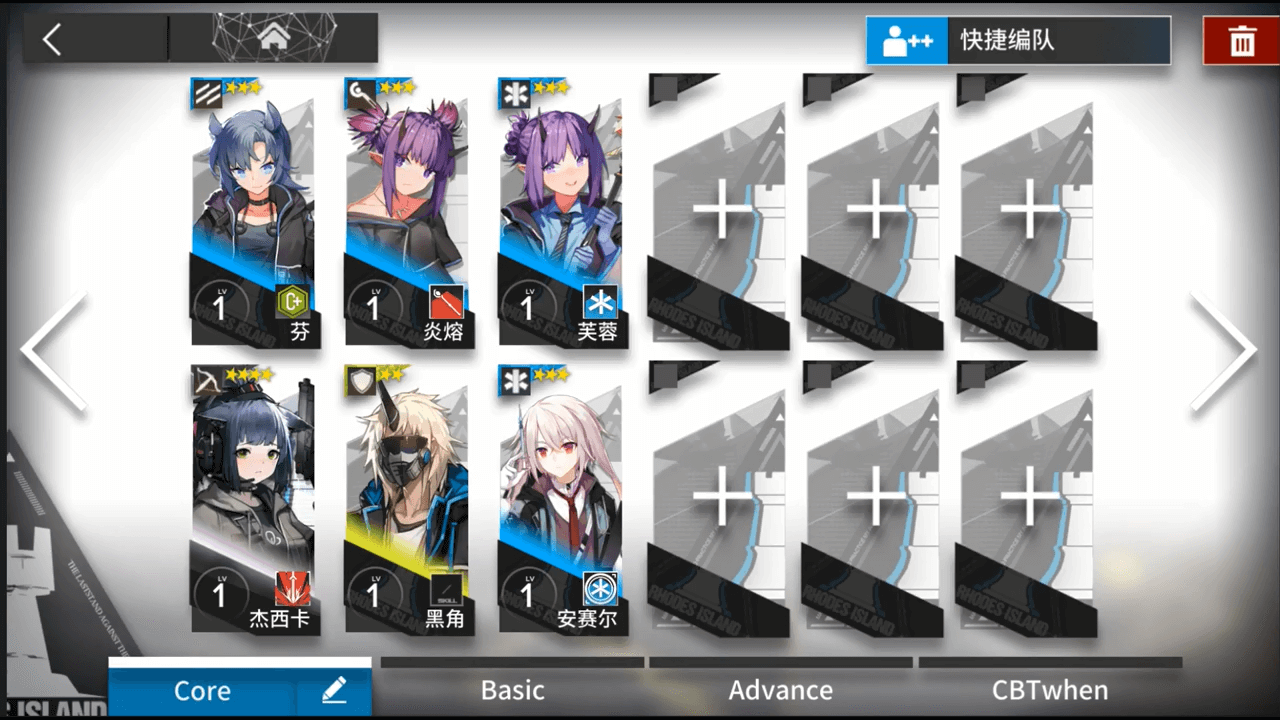
Start by setting a “core” composition.
The operators included within this selection will be the backbone of the team and will more than likely be used 90% of the time.
The core will consist of is a Vanguard, one anti-air Sniper, one Caster, one Defender, and two Medics. For more details on individual classes, check the Class Guide Here:
First, the team needs someone cheap and reliable to hold the frontline at the start of a map until things get settled; even better if they can provide us extra deploy points. These are exactly the traits of vanguards: they have the lowest cost out of all operators and have skills that provide an extra income of Deployment Points.
Second, many stages have drones that need to be taken care of and they cannot be blocked. In most situations Operators will prioritize the enemy that is closest to the escape point and let these unblockable drones pass.
This is where the anti-air Sniper comes into play. On the Operator's Information Page, the bottom right of the screen will show "Combat Description", in this case, "Targets Aerial Enemies First." Snipers also cost relatively low Deployment Points and deal decent ranged damage.
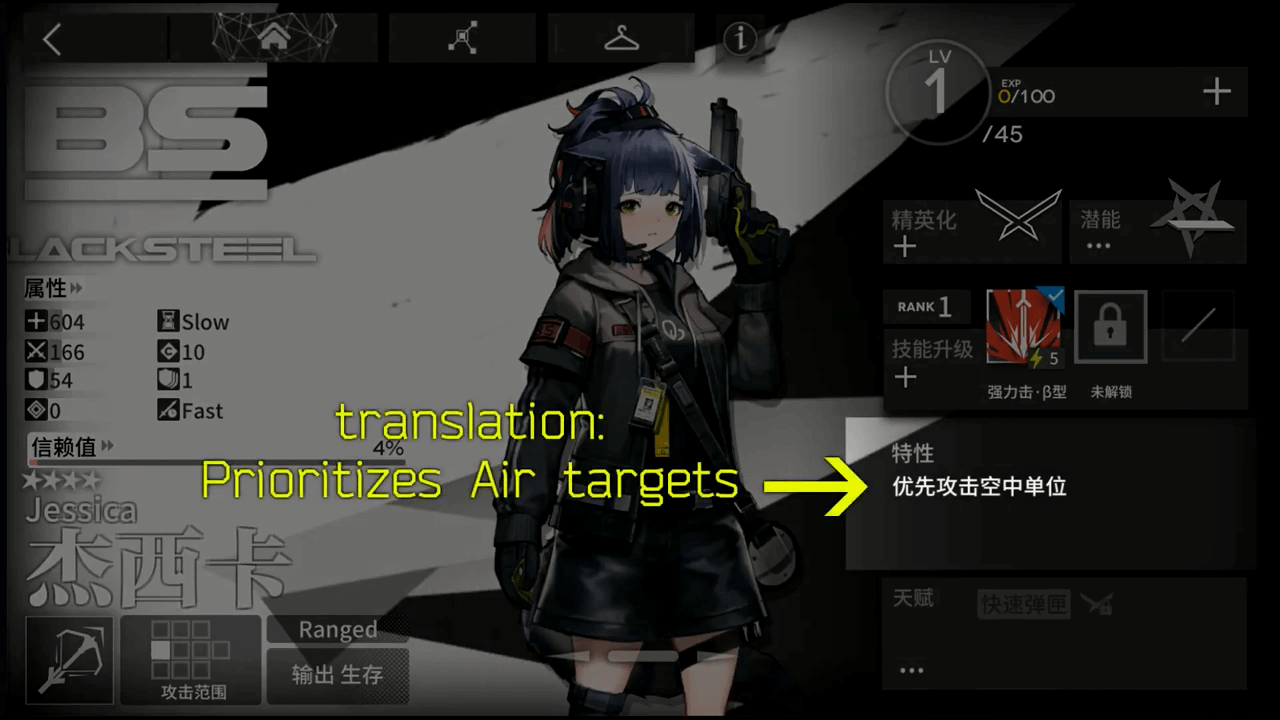
Third; there are enemies with high defense stats, and this usually means that physical damage dealers will deal little to no damage to them. Instead of chipping away in futility, using magic attacks will completely ignore defense and instead target the lower/rarer magic resistance.
Although Supports and a few select Guards have magic capabilities, Casters are the main source of magical damage. As such, it is always a good idea to have at least one of them in a team composition.
Fourth, Defenders are needed for their ability to block a large number of enemies, boasting high defense and hp stats for better survivability. It's important to note that some Defenders have healing skills instead of defense buffs. While all defenders can block three enemies, these healing Defenders start off blocking only 2 enemies until their first promotion to E1.
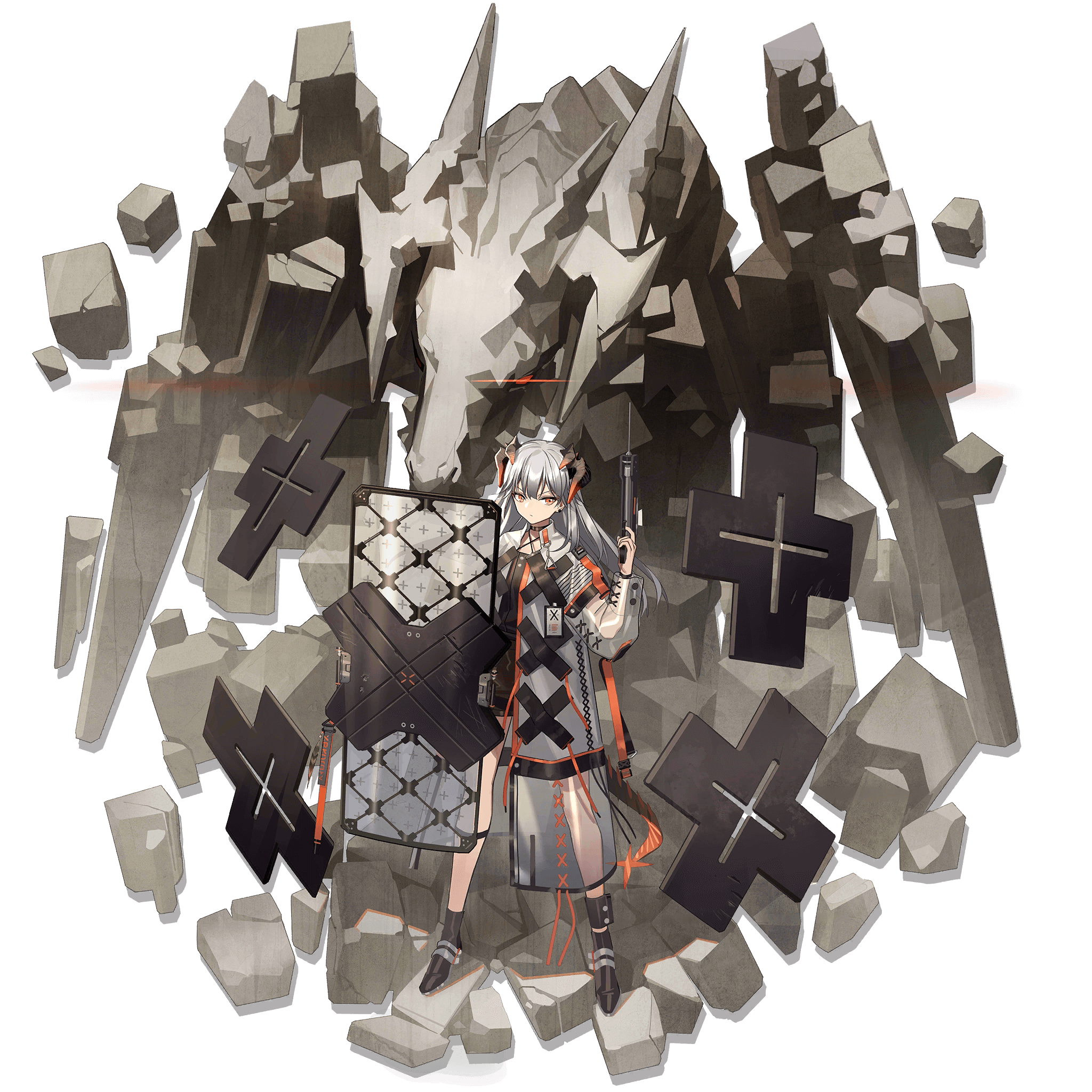 Saria, an example of a heal-tank type Operator.
Saria, an example of a heal-tank type Operator.The Rest of the Team
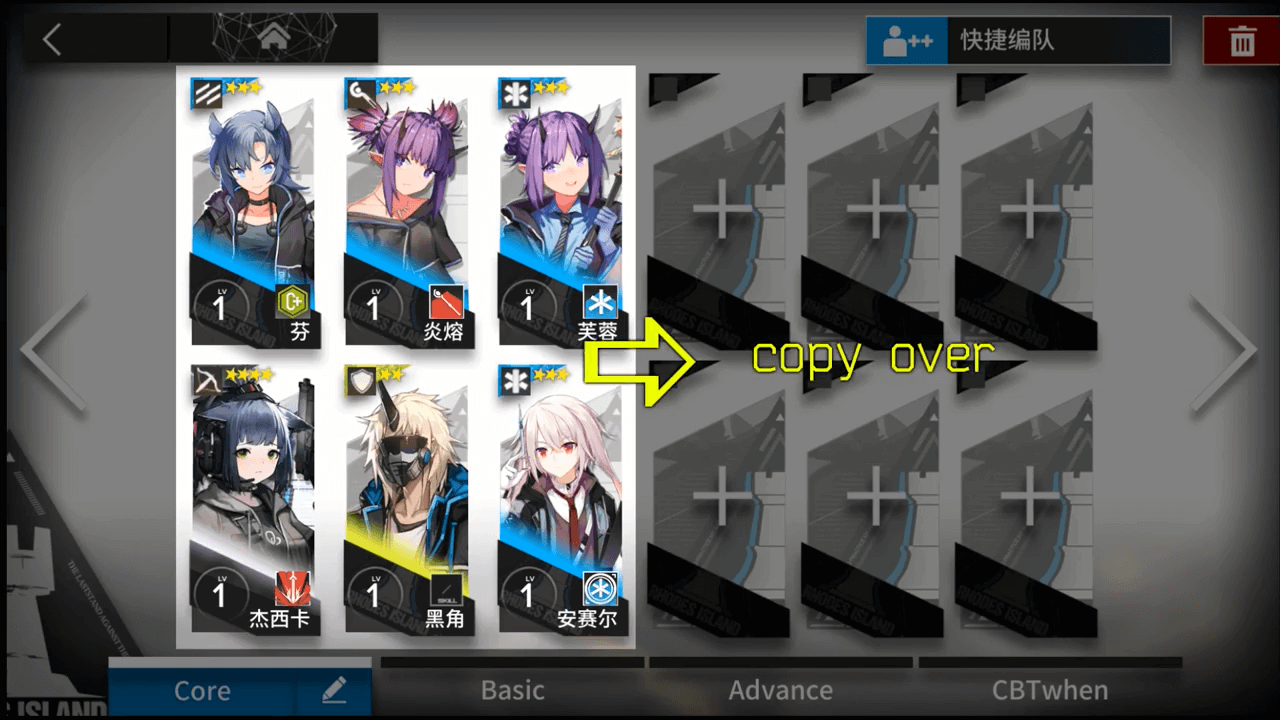
For the purpose of simplicity, this “Basic Setup'' template is generally balanced and able to deal with most situations that it faces. Next, this guide will introduce some of the more advanced setups that can be used and the thought process behind forming them.
Basic Setup
The basic setup is essentially an extension of the “core”, where almost every class is doubled. The difference is that instead of having 4 medics, it adds 2 guards. Instead of adding another defender, the last slot is a flexible choice.
In this team composition, the second sniper does not have to be anti-air, but can be a different type of sniper like an AoE sniper—Shirayuki for example. The same goes for the caster slot; if the first caster is AoE, the second can be single target, like Amiya.
For the guard slots, it is highly recommended to have a Duelist. These are easily found by checking their trait description, which should specify they can only block one enemy at a time. The other is a free pick: just pick your favorite.
In the end, the basic setup should have 2 Vanguards, 2 Snipers, 2 Casters, 2 Medics, 2 Guards, 1 Defender, and an operator of choice.
Of course, this is just a template. Team compositions should be changed to what the situation calls for.
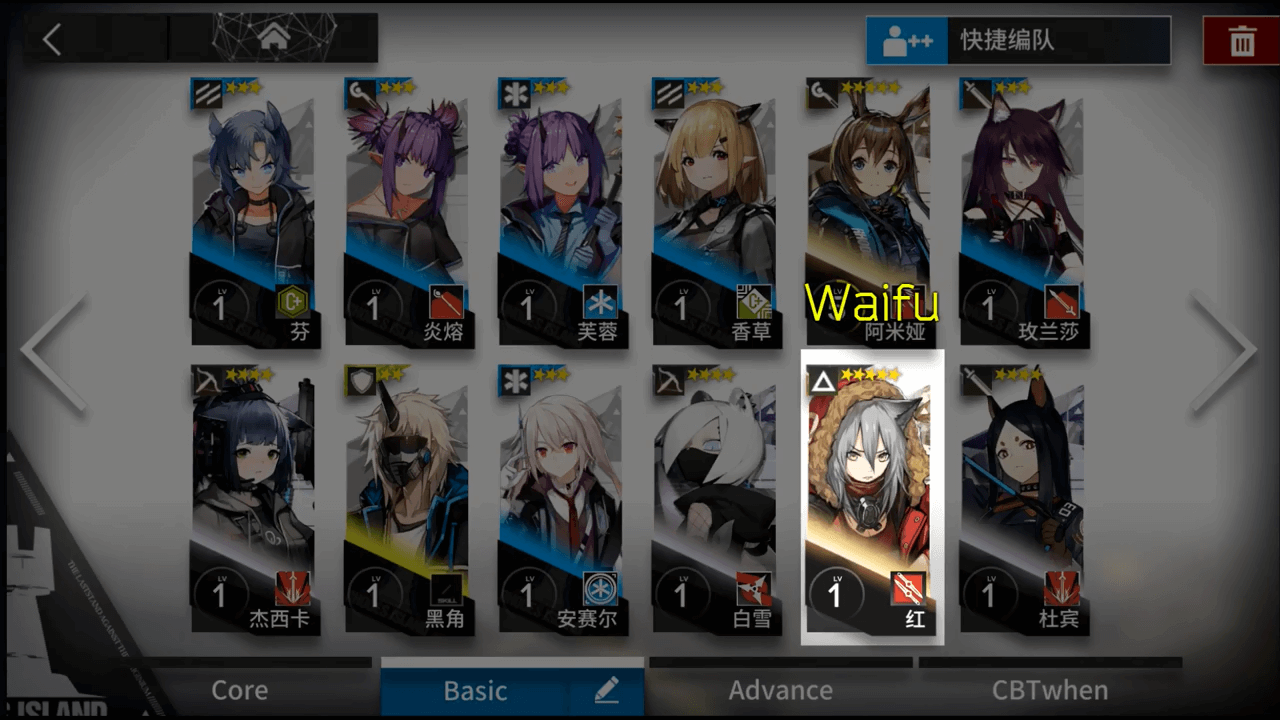
Operator of choice
Specific Setup Situations: Dealing with Swarms
This is a map where there is only one exit and a huge flow of enemies. Single target operators might not kill them all in time, which means AoE operators are preferred along with an extra defender to hold the enemies in place.
For this, a team that involves gathering all enemies into one concentrated location and weaving a kill zone is optimal. First, set up 3 AoE operators and 2 defenders as the core. The defenders gather all the enemies, and the AoE Operators defeat them all in one fell swoop.
Consider also that defenders and AoE operators are rather costly, taking as much as 30 deploy points, and may take too long to deploy without sufficient income of Deployment Points (DP). An extra Vanguard will solve the DP drought. To complete this team, bring along an anti-air Sniper and a Duelist-type Guard to deal with drones or stray single enemies.
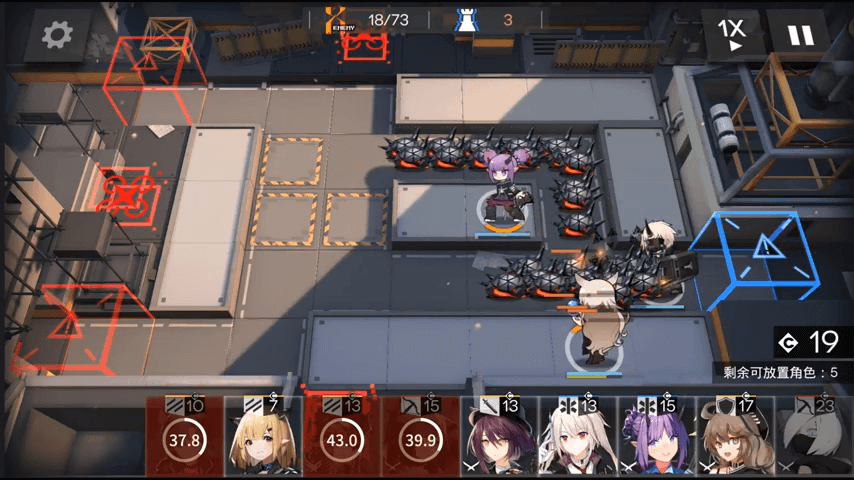
Supports/Specialists
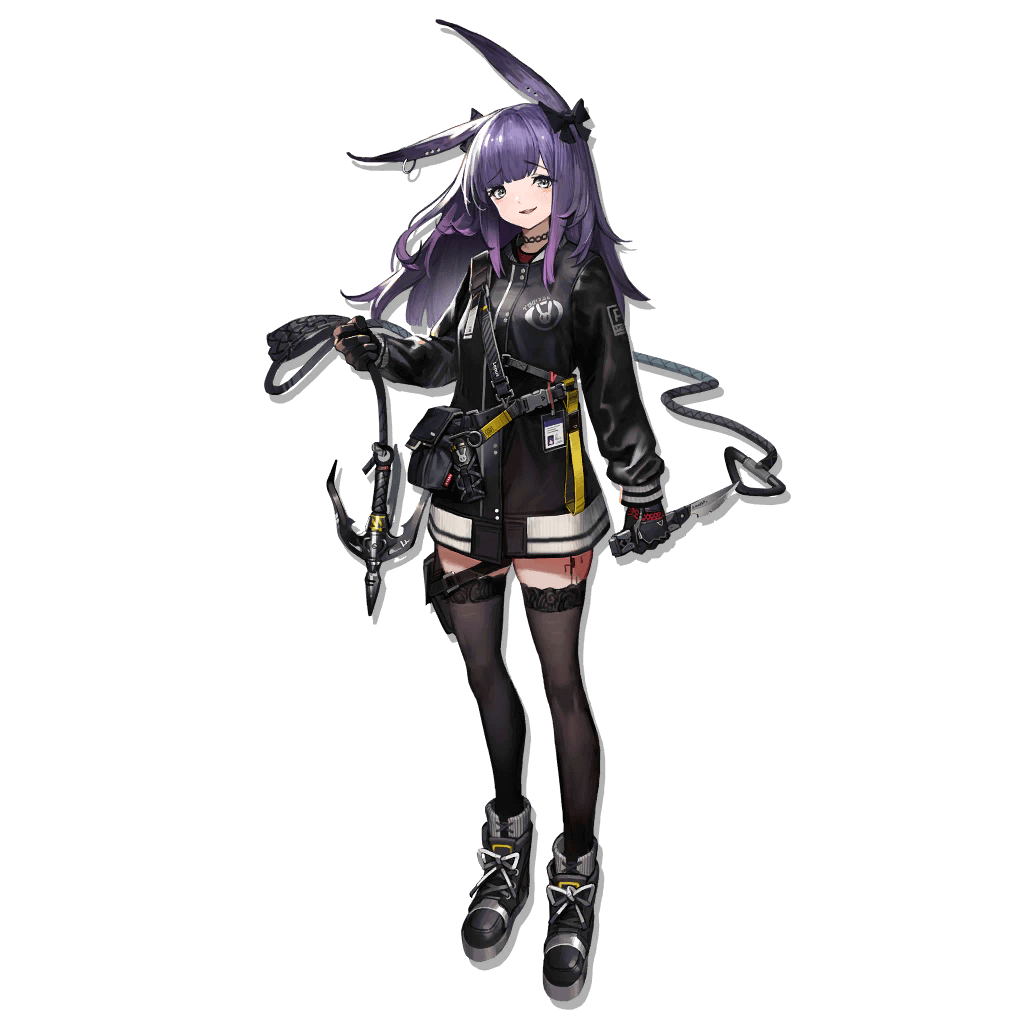 Rope, a Specialist who pulls enemies.
Rope, a Specialist who pulls enemies.
Readers may notice the absence of the support and specialist classes in these teams. This is mainly because these two types of classes, like their names imply, focus mostly on supporting the team through a specific niche; they stall for time or specialize in some aspects like having greatly decreased re-deploy time, or pushing and pulling enemies off ledges.
That doesn't mean that supports can’t deal damage, or that specialists can’t be used as guards. It just requires knowledge about specific operators within those categories. The takeaway should be that as players get more familiar with the game and its operators, they can further diversify their teams with specialists and supports to match their playstyle.
Newbie Recommendations
Having said all that, let's go over some operators that are great picks for a new team.
Shaw
| Shaw is a specialist operator who has the ability to push enemies. In some maps of Arknights, Operators can push or pull enemies into holes or off ledges for an instant kill, which is what Shaw can do. She can be placed on both ranged or melee tiles, and can also serve as a frontline unit should the situation call for it. |
Melantha
| Next is Melantha, a guard operator who boasts high health and attack while also being relatively cheap to deploy. In certain cases, players will want to play aggressively and assassinate specific targets before they can wreak havoc on our defensive line. Melantha is a duelist, and having high hp allows her to withstand attacks for long enough to assassinate her target. Once her job is done, she can simply have her retreat until she is needed again. |
Rangers
| Rangers is a 2 star Sniper. Despite his low rarity, he has an incredible talent which allows him to deal 50% more damage against air targets, which, in turn, makes him useful from the early and mid-stages of the game all the way to some endgame stages. Being a 2 Star Operator means he is very cheap to deploy, but also limits his growth and makes him relatively weak when dealing with anything outside of air units. On the whole, he is an operator that is easy to level up and provides a lot of value. |
Anti Air Alternatives: Kroos and Jessica
| On the subject of anti-air, Kroos and Jessica are solid alternatives to Rangers. Both are able to deal with air and ground units with relative ease, and unlike Rangers, they can promote to further increase their strength. The main difference between Kroos and Jessica lies in their maximum promotion levels. Jessica can be promoted up to E2 but costs more materials; Kroos can only be promoted once to E1 but has a lower cost. | |
Fang
| Finally, we have Fang, a Vanguard operator. Cheap to deploy and boasting relatively high defense, Fang will be the first on the field to stem the tide of enemies until other Operators can be deployed. Fang’s selling point is her talent, which almost halves her deployment cost in comparison to vanguards of higher rarity. These few points may not seem like much at first, but in reality, every point counts when trying to setup quickly. |
Quick Tip: Make sure to have at least two 3 Star operators in the team, as the game completely refunds the cost of leveling them up via mission board, making it basically free.
Leveling Order for Operators
To wrap this all up, there are two points about leveling the team.
Generally speaking, it's better to level Operators evenly rather than have a single Operator overleveled. It is crucial to remember that Operators function as a team. Damage dealers can’t deal damage if they’re low level, defenders cannot hold the line if medics are weak, and players might not even get past the first wave if Vanguards are falling left and right.
Another topic is “how far should I level up to?” Answers will vary depending on player and playstyle, but my personal recommendation is to get an operator to E1 level 30. Doing so allows players to actually get a feel of how the unit operates and then decide whether or not they want to continue using them.
Source : gamepress.gg

